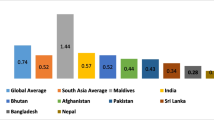Abstract
Governance is hybrid to the extent that it involves diverse organizational forms, jurisdictional domains, and stakeholders across the public and private sectors. This article analyses the governance of household solid waste management in Sweden from a hybridity perspective, with the City of Helsingborg in North-Western Scania in Sweden as an example. The governance arrangements comprise municipal and company-based organizations, conflicting legislation, and long planning and investment horizons. The latter has resulted in significant innovations over the last 20 years, while changes in organizational forms, tasks, networks and jurisdictions have caused tensions in governance processes and relationships.
Similar content being viewed by others
References
Andersen, O. J., & Pierre, J. (2010). Exploring the strategic region: rationality, context and institutional collective action. Urban Affairs Review, 46(2), 218–240.
Bäck, H. (2003). Party politics and the common good in Swedish local government. Scandinavian Political Studies, 26(2), 93–123.
Bel, G., & Warner, M. (2008). Does privatization of solid waste and water services reduce costs? A review of empirical studies. Resources, Conservation and Recycling, 52(12), 1337–1348.
Beveridge, R., & Guy, S. (2009). Governing through translations: intermediaries and the mediation of the EU’s urban waste water directive. Journal of Environmental Policy and Planning, 11(2), 69–85.
Bevir, M. (2011). Governance as theory, practice and dilemma. In M. Bevir (Ed.), The Sage handbook of governance (pp. 1–16). London: Sage.
Bulkeley, H., & Askins, K. (2009). Waste interfaces: biodegradable waste, municipal policy and everyday practice. The Geographical Journal, 175(4), 251–260.
Corvellec, H., Bramryd, T., & Hultman, J. (2012). The business model of solid waste management in Sweden: a case study of two municipally-owned companies. Waste Management & Research. doi:10.1177/0734242X11427944.
Denters, B. (2010). Local governance. In S. Osborne (Ed.), The new public governance? Emerging perspectives on the theory and practice of public governance (pp. 313–329). London & New York: Routledge.
Dijkgraaf, E., & Gradus, R. (2008). The waste market: Institutional developments in Europe. Heidelberg: Springer.
Dir. (2009:81). Kommunala företag. (OFUKI-utredningen. Utredningen om offentliga företag - upphandling, kontroll, insyn). Government directive: http://www.regeringen.se/content/1/c6/13/14/07/7696f0b9.pdf.
Dir. (2010:115). Tilläggsdirektiv till Utredningen om offentliga företag - upphandling, kontroll, insyn (Fi 2009:08). Governmentdirective: http://www.regeringen.se/content/1/c6/15/48/56/15bcd408.pdf
EU Directive 2004/18/EG 2004-03-30. Europaparlamentets och Rådets direktiv 2004/18/EG av den 31 mars 2004 om samordning av förfarandena vid offentlig upphandling av byggentreprenader, varor och tjänster, EUT L 134, 30.4.2004:http://eur-lex.europa.eu/LexUriServ/LexUriServ.do?uri=OJ:L:2004:134:0114:0240:SV:PDF.
European Commission. (2010). Europeiska kommissionen, Generalsekretariatet, Motiverat yttrande, överträdelse nr 2009/4080, 2010-10-28, K(2010) 7343.
Gossas, M. (2006). Kommunal samverkan och statlig nätverksstyrning. Stockholm: Institutet för Framtidsstudier.
Hulst, R., van Montfort, A., Haveri, A., Airaksinen, J., & Kelly, J. (2009). Institutional shifts in inter-municipal service delivery: an analysis of developments in eight Western European countries. Public Organization Review, 9(3), 263–285.
Johansson, T., & Siverbo, S. (2011). Governing cooperation hazards of outsourced municipal low contractibility transactions: an exploratory configuration approach. Management Accounting Research, 22(4), 292–312.
Karré, P.M. (2011). Heads and tails: Both sides of the coin. Published doctoral thesis. Den Haag: Eleven.
Kickert, W. (2001). Public management of hybrid organizations: governance of quasi-autonomous executive agencies. International Public Management Journal, 4(2), 135–150.
Kooiman, J. (2003). Governing as governance. Thousand Oaks: Sage.
LOU SFS 2007:1091. Lag (2007:1091). omoffentligupphandling. Law on public procurement: http://www.riksdagen.se/sv/Dokument-Lagar/Lagar/Svenskforfattningssamling/_sfs-2007-1091/.
Montin, S. (2007). Kommunerna och klimatpolitiken—ett exempel på tredje generationens politikområden. Statsvetenskaplig Tidskrift, 109(1), 37–57.
Nordvästra Skånes Renhållnings AB. (2012). www.nsr.se.
Osborne, S. (2010). Introduction—The (new) public governance: A suitable case for treatment? In S. Osborne (Ed.), The new public governance? Emerging perspectives on the theory and practice of public governance (pp. 1–16). London and New York: Routledge.
Pierre, J. (Ed.). (2000). Debating governance: Authority, steering, and democracy. Oxford: Oxford University Press.
RÅ. (2008). Regeringsrätten, mål nr 175-06, avgörandedatum 2008-03-17. RÅ 2008 ref 26: https://lagen.nu/dom/ra/2008:26.
Rättssekretariatet. (2010). Svar på motiverat yttrande angående tillämpningen av direktiv 2004/18/EG om samordning av förfarandena vid offentlig upphandling av byggentreprenader, varor och tjänster (KOM:s ref SG-Greffe(2010) D/17230, ärendenummer 2009/4080). Stockholm: Rättssekretariatet, utrikesdepartementet, regeringskansliet. Dated 2010-12-29.
Slater, R., Frederickson, J., Thomas, C., Wield, D., & Potter, S. (2007). A critical evaluation of partnerships in municipal waste management in England. Resources, Conservation and Recycling, 51(3), 643–664.
Sopsamarbete Skåne Nordväst. (2012). www.sopsamarbete.se.
SOU. (2011:43). Offentlig upphandling från eget företag?!—och vissa andra frågor. Betänkande av Utredningen om offentliga företag - upphandling, kontroll, insyn (OFUKI-utredningen). Stockholm: Regeringskansliet. Swedish official government investigation report: http://www.regeringen.se/content/1/c6/16/72/89/8e0351ba.pdf, 2012-08-22.
Stoker, G. (1998). Governance as theory: five propositions. International Social Science Journal, 50(1), 17–28.
Thomasson, A. (2009). Exploring the ambiguity of hybrid organizations: a stakeholder approach. Financial Accountability and Management, 25(3), 353–366.
Torres, L., & Pina, V. (2002). Changes in public service delivery in the EU countries. Public Money and Management, 22(4), 41–48.
Treib, O., Bähr, H., & Falkner, G. (2007). Modes of governance: towards a conceptual clarification. Journal of European Public Policy, 14(1), 1–20.
Wollmann, H. (2004). Local government reforms in Great Britain, Sweden, Germany and France: between multi-function and single-purpose organizations. Local Government Studies, 30(4), 639–665.
Wollmann, H. (2008). Reforming local leadership and local democracy: the cases of England, Sweden, Germany and France in comparative perspective. Local Government Studies, 34(2), 279–298.
Author information
Authors and Affiliations
Corresponding author
Rights and permissions
About this article
Cite this article
Lindqvist, K. Hybrid Governance: The Case of Household Solid Waste Management in Sweden. Public Organiz Rev 13, 143–154 (2013). https://doi.org/10.1007/s11115-013-0229-8
Published:
Issue Date:
DOI: https://doi.org/10.1007/s11115-013-0229-8




